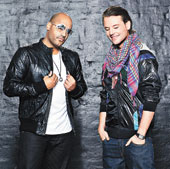 |
| Rabbi Shergill in an earlier performance in the city. A Telegraph file picture |
The image of a Sardar dressed in a white salwar kameez walking through the desert or stationed at a railway platform, a strange guitar in hand, a kind of sadness in his eyes and a soul-stirring melody on his lips, has caught the entire nation’s fancy.
From discotheques to social occasions, FM stations to car stereos, Rabbi Shergill’s music is played everywhere.
But it took the man from Delhi four long years of struggle before the country rocked to Bulla ki jaana main kaun. “Everybody who heard the song praised my efforts. But nobody was willing to stick their neck out for me,” says the soft-spoken Sardar.
The song climbed its way up the charts and firmly stayed there. It mattered little whether most people could understand a single word of the lyrics or decode the genre.
Rabbi’s music draws from the philosophy of 18th Century Sufi poet Baba Bulle Shah and the rock-star attitude of Bruce Springsteen ? an unusual combination, just like his melodies.
“These are two people I really look up to. So when I sat down to compose, the influence was natural,” explains Rabbi. In fact, three songs in his debut album ? including Bulla ? are the works of Bulleh Shah. “Even in those oppressive times, the man was so bohemian. He denounced all forms of oppression against speech and thought,” says Rabbi about the poet.
As far as Springsteen is concerned, Rabbi might be a big fan, but he would never switch over to English. “Punjabi is the only language in which I can convey my emotions. Moreover, Punjabi both as a language and as a culture has a very rich repertoire of folk songs.”
Though confident of his creations, Rabbi is yet to understand exactly what turned him into a national sensation. “I really cannot fathom what people liked about me, though I admit the track is very good. The confused urban class identifies with Bulla ki jaana. The song reflects the agony of a person who does not know who he is. If we do not have a proper introduction with ourselves, materialistic things are of no use,” he says.
Rabbi himself hails from a modest background. Born to a family of farmers in a village near Amritsar, he completed his education in Delhi. “My peasantry background was of immense help during my phase of struggle when I really had to toil for everything,” says the singer who has done his Masters in philosophy from Delhi University.
The swinging Sardar even has a fan in Amitabh Bachchan, one of the first to fall for Bulla? in 2003, prior to the commercial release. “Yes, he liked the track and borrowed it to listen? that was it. I think the media went a little overboard with it.”
But Bollywood is a strict no-no for Rabbi. “It’s just not my cup of tea. My genre of music will not find many takers in Mumbai. I only did Waisa Bhi Hota Hai because Shashank is a very good friend of mine.”
He even refused the Bhatts who wanted Bulla ki jaana for their movie Paap.
On the cards are shows and more shows. “I have recorded a song but there are no plans of releasing it now,” informs Rabbi.
There is that other dream though. “I want to sing in front of 60,000 people just like my idol Bruce Springsteen. I guess anybody with a guitar in his hand and a passion in his heart would want to do the same,” signs off Rabbi.










